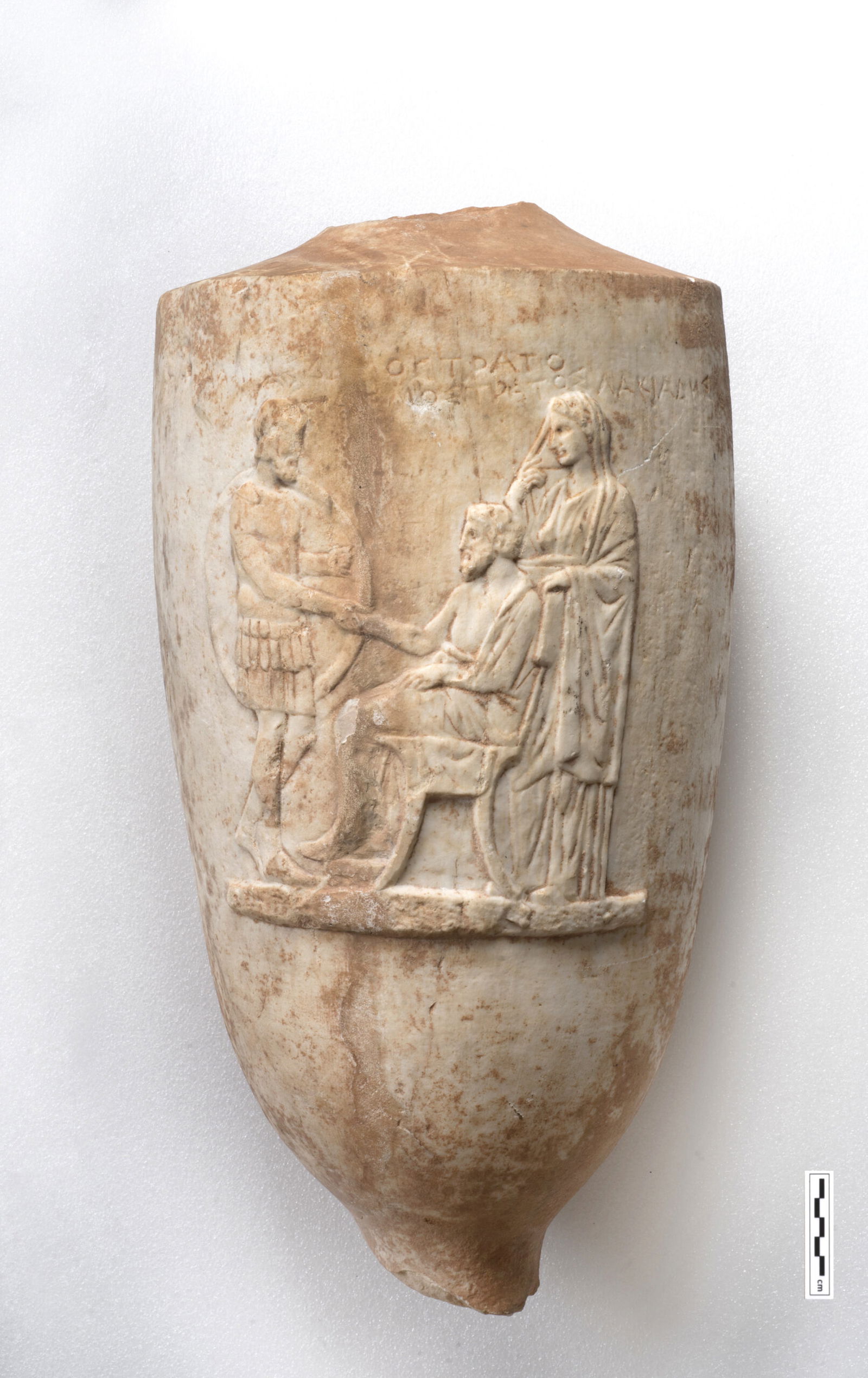Around the World briefs

By Associated Press
Two plundered ancient Greek vases are repatriated from Switzerland
ATHENS, Greece | Two plundered marble vases that marked ancient Athenians’ graves more than 2,000 years ago, including one with an emotional family scene, have been returned to Greece from Switzerland.
Greece’s Culture Ministry said in a statement Tuesday that the two white marble works, which were decorated with relief sculptures, were brought back following a long legal battle.
Both are broken, with the necks and parts of the bases missing. One measures 60 centimeters 23 inches in height, while the other is 21 inches. They date to the 4th century B.C. and would have stood on family graves somewhere near Athens, but because they were clandestinely dug up and illegally exported it’s unlikely the precise spot will be found.
The one is decorated with a family scene, showing a seated elderly man being bid farewell by his son — wearing the armor of an ancient Athenian soldier — and wife. The other has plant motifs.
Greek Culture Minister Lina Mendoni said the return of plundered antiquities from abroad is a “top political priority” for the ministry, which has secured several high-profile repatriations in recent years.
The ministry statement said the two vases were first located in 2002 in Basel, Switzerland, during a raid by Italian and Swiss authorities on a warehouse used by an Italian antiquities dealer. But in 2014 they were returned to the dealer after an Italian court ruled they were not of Italian origin.
In 2017, Greek authorities noticed that the works were offered for sale by a Swiss dealer, and successfully sought their seizure by Switzerland. The ministry said it emerged that Swiss authorities had sold them to the second dealer to cover legal costs incurred by the Italian dealer.
After more than six years of legal efforts, they were delivered to Greek officials on June 26 following out-of-court negotiations, the ministry said.
They will be exhibited at a museum with finds from the Kerameikos, the main cemetery of ancient Athens.
British Nurse Lucy Letby, already convicted of killing seven babies, found guilty in attempted killing
LONDON | A British neonatal nurse who is serving a life sentence for murdering seven babies and attempting to murder six others was convicted Tuesday of trying to kill another infant in her care.
Lucy Letby, 34, tried to kill a baby girl known as Child K in February 2016 at the Countess of Chester Hospital in northwestern England, a jury decided after a previous panel failed to reach a verdict on that count.
Letby, who testified that she never harmed a child, was found guilty in Manchester Crown Court last August of most of the crimes she was charged with that took place between June 2015 and June 2016 at the hospital’s neonatal unit.
On Tuesday, a different jury convicted her of trying to murder a “very premature” baby girl by dislodging her breathing tube in the early hours of Feb. 17, 2016.
The parents of the baby gasped and cried as the verdict was read after three and a half hours of deliberations.
Letby showed no emotion.
Senior Prosecutor Nicola Wyn Williams said Letby removed the baby’s breathing support and a doctor found her standing by doing nothing as the child struggled. She added that Letby removed the breathing tube two more times over the next few hours, “in an attempt to cover her tracks and suggest that the first dislodgment was accidental.”
“These were the actions of a cold-blooded, calculated killer,” she said. “Staff at the unit had to think the unthinkable — that one of their own was deliberately harming and killing babies in their care.”
Dr. Ravi Jayaram, a pediatrician at the hospital, told jurors he saw “no evidence” that Letby had done anything to help the baby as he walked in and saw her standing next to the newborn’s incubator.
Letby told the jury of six women and six men she had no recollection of any such event. She denied she harmed Child K, and added that she had not committed any of the offenses she had been convicted of.
Letby is serving a life sentence with no chance of release — the most severe punishment possible under British law, which does not allow the death penalty. Only three other women have received such a harsh sentence in the U.K.
Vandals behead a controversial sculpture of Mary giving birth to Jesus in an Austrian cathedral
VATICAN CITY | Vandals have beheaded a sculpture featuring the Virgin Mary giving birth to Jesus that had been exhibited in the cathedral in the Austrian city of Linz and drawn criticism from some Catholics who said it was blasphemous.
The sculpture had been on view at the St. Mary Cathedral, Austria’s largest, as part of an art installation project on women’s roles, family images and gender equality, the Linz diocese said in a statement. It added that the incident, which occurred on Monday, had been reported to police.
The identity of the vandals wasn’t known. But Alexander Tschugguel, an Austrian traditionalist Catholic responsible for the so-called “Pachamama” act of vandalism during the Vatican’s 2019 Amazon synod, said in a social media post Tuesday that he had been contacted by those responsible.
Tschugguel praised the “Hero of Linz” and posted what he said was a statement from the anonymous vandal explaining the motivation. The statement implied that the person’s emails and calls to the diocese to complain about the sculpture had been ignored.
“Therefore, in view of this abominable and blasphemous caricature, urgent and decisive action was required,” the statement said, adding that the beheading was the fastest way to disfigure the sculpture so it no longer resembled Mary.
The episcopal vicar for education, art and culture in the Linz diocese, the Rev. Johann Hintermaier, condemned the beheading of the statue.
“We were aware that we were also provoking debate with this installation. If we have hurt people’s religious feelings, we are sorry, but I strongly condemn this violent act of destruction, the refusal to engage in dialog and the attack on the freedom of art,” the diocesan statement quoted him as saying.
The sculpture was on a pedestal in the middle of the room inside the cathedral, showing Mary sitting on a rock and giving birth. The diocese said it referred to the nativity scene in the cathedral, which is also known as the Mariendom.
The artist who created the “crowning” sculpture, Esther Strauss, also condemned the destruction, according to the Linz diocese statement.
“Most portraits of the Virgin Mary were made by men and have therefore often served patriarchal interests,” she said, adding that in her sculpture “Mary gets her body back.”
“Whoever removed the head from the sculpture was very brutal,” Strauss said. “For me, this violence is an expression of the fact that there are still people who question women’s right to their own bodies. We have to take a very firm stance against this.”
Tschugguel became a hero to traditionalists in 2019, when he snuck into a Vatican-area church, stole Amazonian indigenous statues of pregnant women, and threw them into the Tiber River in a videotaped act that was quickly shared online.
Amazonian delegates to Pope Francis’ synod, or meeting, had brought the statues with them to Rome and had displayed them in the Vatican gardens during an opening prayer for the meeting, which was discussing how the Catholic Church could better serve the indigenous faithful in the region. Critics complained that the display of “pagan” idols in the Vatican was sacrilegious.
The episode became known as the Pachamama incident, named for the types of fertility statues involved, and was visceral evidence of the lengths to which conservative and traditionalist Catholics were willing to go to vent their opposition to history’s first Latin American pope.
In the end, Italian police divers recovered the statues from the river and returned them to the Vatican. Francis apologized to the Amazonian delegates, and the statues were displayed in the closing sessions of the synod.
Dozens rally in Pakistan after a Christian man is sentenced to death for blasphemy
KARACHI, Pakistan | Dozens of members from Pakistan’s civil society rallied on Tuesday in the southern port city of Karachi against the death sentence handed down to a Christian man on blasphemy charges, nearly a year after one of the worst mob attacks on Christians in the country.
Several Christians also joined the rally which comes a day after a court in Sahiwal in the Punjab province announced the death sentence to Ehsan Shan after finding him guilty of sharing “hateful content” against Muslims on social media.
Shan’s lawyer Khurram Shahzad said on Monday he will appeal the verdict.
He was arrested in August 2023 after groups of Muslim men burned dozens of homes and churches in the city of Jaranwala in Punjab after some residents claimed they saw two Christian men desecrating pages from Islam’s holy book, the Quran. The two men were later arrested.
Though Shan was not party to the desecration, he was accused of reposting the defaced pages of the Quran on his TikTok account.
At Tuesday’s rally in Karachi, a Christian leader Luke Victor, called for Shah’s release.
He also demanded action against those who were involved in burning churches and homes of Christians in Jaranwala.
Blasphemy accusations are common in Pakistan. Under the country’s blasphemy laws, anyone found guilty of insulting Islam or Islamic religious figures can be sentenced to death. While authorities have yet to carry out a death sentence for blasphemy, often a mere accusation can cause riots and incite mobs to violence, lynching and killings.
—From AP reports


